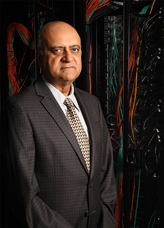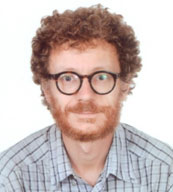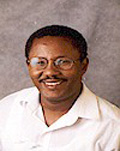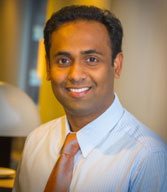Keynote Speakers
Prof. Ravi Sandhu , University of Texas at San Antonio, USA

Title of Talk:Security and Trust Convergence: Attributes, Relations and Provenance
Biography: Prof. Ravi Sandhu is founding Executive Director of the Institute for Cyber Security at the University of Texas San Antonio, and holds an Endowed Chair. He is an ACM, IEEE and AAAS Fellow and inventor on 29 patents. He has received the IEEE Computer Society Technical Achievement award, and the ACM SIGSAC outstanding innovation and outstanding contribution awards. He is past Editor-in-Chief of the IEEE Transactions on Dependable and Secure Computing, past founding Editor-in-Chief of ACM Transactions on Information and System Security and a past Chair of ACM SIGSAC. He founded ACM CCS, SACMAT and CODASPY, and has been a leader in numerous other security research conferences. His research has focused on security models and architectures, including the seminal role-based and attribute-based access control models, and their applications in cloud, mobile and social computing. His papers have over 27,000 Google Scholar citations including over 6,500 for the RBAC96 paper.
Talk description: Security and trust are interdependent concepts which need to converge to address the cyber security needs of emerging systems. This talk will lay out a vision for this convergence. We argue that security and trust are inherently dependent on three foundational concepts: attributes, relations and provenance. Security researchers have dealt with these three concepts more or less independently. In the future convergence of these three is required to achieve meaningful cyber security. The talk will speculate on some research and technology challenges and opportunities in this respect.
Dr. Michael Steiner, IBM Research - India

Title of Talk: Searchable Encryption for the Real World: Theory and Practice
Biography: Dr. Michael Steiner is a research staff member of the IBM India Research Lab and the IBM T.J. Watson Research Center. He received a Diploma in computer science from the Eidgenössische Technische Hochschule (ETH) Zürich, Switzerland in 1992 and a Ph.D. in computer science from the Saarland University, Saarbrücken, Germany in 2002. His interests cover secure and reliable systems as well as cryptography. At IBM, his work ranged from cryptographic protocol design & analysis, over security architectures & implementations to penetration testing in domains as varied as electronic commerce & payment systems, compliance management, web2.0, cloud and smart grid. He is co-author of more than 50 scientific publications and received seventeen patents with more under evaluation.
Talk description: In this talk, I will address the problem of performing private database queries, motivated by real-world requirements, e.g., of protecting sensitive data in the cloud or allowing law enforcement & intelligence agencies to privately yet accountably query third-party databases. I will discuss the technical difficulties which might lead to lower bounds and necessitates, e.g., the co-development of the cryptographic protocols with the overall system design. I will present corresponding practical solutions which provide real-world scalability and discuss interesting aspects of these solutions.
Dr. Rajkumar Buyya, Professor of Computer Science and Software Engineering, Future Fellow of the Australian Research Council, and Director of the Cloud Computing and Distributed Systems (CLOUDS) Laboratory at the University of Melbourne, Australia
 Title of Talk: Innovative Cloud and BigData Computing with Aneka Platform
Title of Talk: Innovative Cloud and BigData Computing with Aneka Platform
Biography: Dr. Rajkumar Buyya is Professor of Computer Science and Software Engineering, Future Fellow of the Australian Research Council, and Director of the Cloud Computing and Distributed Systems (CLOUDS) Laboratory at the University of Melbourne, Australia. He is also serving as the founding CEO of Manjrasoft, a spin-off company of the University, commercializing its innovations in Cloud Computing. He has authored over 450 publications and four text books including "Mastering Cloud Computing" published by McGraw Hill and Elsevier/Morgan Kaufmann, 2013 for Indian and international markets respectively. He also edited several books including "Cloud Computing: Principles and Paradigms" (Wiley Press, USA, Feb 2011). He is one of the highly cited authors in computer science and software engineering worldwide (h-index=78, g-index=156, 27900+ citations). Microsoft Academic Search Index ranked Dr. Buyya as the world's top author in distributed and parallel computing between 2007 and 2012. He is an "ISI Highly Cited Researcher".
Software technologies for Grid and Cloud computing developed under Dr. Buyya's leadership have gained rapid acceptance and are in use at several academic institutions and commercial enterprises in 40 countries around the world. Dr. Buyya has led the establishment and development of key community activities, including serving as foundation Chair of the IEEE Technical Committee on Scalable Computing and five IEEE/ACM conferences. These contributions and international research leadership of Dr. Buyya are recognized through the award of "2009 IEEE Medal for Excellence in Scalable Computing" from the IEEE Computer Society, USA. Manjrasoft's Aneka Cloud technology developed under his leadership has received "2010 Asia Pacific Frost & Sullivan New Product Innovation Award" and "2011 Telstra Innovation Challenge, People's Choice Award". He is currently serving as the foundation Editor-in-Chief (EiC) of IEEE Transactions on Cloud Computing. For further information on Dr. Buyya, please visit his cyberhome: www.buyya.com
Prof. Jemal H. Abawajy, Director, Parallel and Distributed Computing Lab, Deakin University, Australia
 Title of Talk: Hybrid Resource Allocation Techniques for Cloud Computing Systems
Title of Talk: Hybrid Resource Allocation Techniques for Cloud Computing Systems
Biography: Dr. Jemal H. Abawajy is a full professor at school of Information Technology, Faculty of Science, Engineering and Built Environment, Deakin University, Australia. He is currently the Director of the Parallel and Distributing Computing Laboratory. He is a Senior Member of IEEE Computer Society; IEEE Technical Committee on Scalable Computing (TCSC); IEEE Technical Committee on Dependable Computing and Fault Tolerance and IEEE Communication Society.
Prof. Abawajy’s leadership is extensive spanning industrial, academic and professional areas. He has served on the Academic Board, Faculty Board, IEEE Technical Committee on Scalable Computing Performance track coordinator, Research Integrity Advisory Group, Research Committee, Teaching and Learning Committee and Expert of International Standing Grant and external PhD thesis assessor. Prof. Abawajy has delivered more than 50 keynote addresses, invited seminars, and media briefings and has been actively involved in the organization of more than 200 national and international conferences in various capacity including chair, general co-chair, vice-chair, best paper award chair, publication chair, session chair and program committee. He has also served on the editorial-board of numerous international journals and currently serving as associate editor of the International Journal of Big Data Intelligence and International Journal of Parallel, Emergent and Distributed Systems. He has also guest edited many special issues. Prof. Abawajy is actively involved in funded research supervising large number of PhD students, postdoctoral, research assistants and visiting scholar in the area of Cloud Computing, Big Data, Network and System Security, Decision Support System, and E-healthcare. He is the author/co–author of five books, more than 250 papers in conferences, book chapters and journals such as IEEE Transactions on Computers and IEEE Transactions on Fuzzy Systems. He also edited 10 conference volumes. More info at http://www.deakin.edu.au/~jemal
Dr. Robin Doss, (Associate Head of School (Development & International)), School of Information Technology, Deakin University, Australia
 Title of Talk: Information Discovery in Wireless Sensor Networks
Title of Talk: Information Discovery in Wireless Sensor Networks
Biography: Dr. Robin Doss joined the School of Information Technology, Deakin University, Australia, in 2003 and is currently the Associate Head of School (Development & International). Prior to joining Deakin University, he was part of the technical services group at Ericsson Australia and a research engineer at RMIT University. Robin received a Bachelor of Engineering in Electronics and Communication Engineering from the University of Madras, India in 1999, and a Master of Engineering in Information Technology and a PhD in Computer Systems Engineering from the Royal Melbourne Institute of Technology (RMIT), Australia in 2000 and 2004 respectively. His PhD thesis was on mobility prediction for next generation wireless networks. In 2007, he also completed a Graduate Certificate in Higher Education from Deakin University
Dr. Doss is a senior researcher within the network security and computing (NSC) research lab at Deakin University and has made significant contributions in the areas of network security, network design and protocol development for wireless networks. His research has focused on information gathering in wireless sensor networks, defense against distributed denial of service (DDoS) attacks in the Internet, system recovery in mission critical wireless networks and secure and efficient communication in near field systems. His research has been funded by the National Security Science and Technology (NSST) branch of the office of national security in collaboration with the Defence Signals Directorate (DSD), the Australian Research Council (ARC) and industry partners. Dr. Doss was part of the team of researchers funded through the Research Support for Counter Terrorism (RSCT) initiative of the Australian government to provide advice to the department of Prime Minister and Cabinet.
In 2006, Dr. Doss was a visiting scientist at IBM Research, Zurich Research Laboratory (ZRL), Switzerland where he contributed to the European Union project, e-Sense. Dr. Doss has served as the chair of several international symposia, workshops and conferences in the areas of wireless communication and network security. He serves on the technical programme committee for several conferences on wireless communications and is a regular reviewer for international journals and PhD theses. He is also an affiliate researcher with the ARC Research Network on Intelligent Sensors, Sensors Networks and Information Processing (ISSNIP)
He has published widely and his research results have been published in the IEEE Transactions on Parallel and Distributed Systems, IEEE Transactions on Information Forensics and Security, IEEE Transactions on Dependable and Secure Computing, IEEE Communications Letters, Computer Networks and Ad Hoc Networks among others.
Talk description: The data gathering capabilities of wireless sensor networks (WSNs) are particularly attractive for mission critical operations that can be deployed in unattended and hostile environments such as battlefield surveillance, military reconnaissance and emergency response; so intelligence can be gathered without the risk of human casualties. Traditional approaches for information discovery in WSNs have assumed the communication pattern as many-to-one where sensors gather information and then push to a central data repository, the “sink”. However, mission critical applications on WSNs are intended to work without a main control centre (such as a sink) and they demand life/time critical information and support for unique traffic patterns that maximize the network lifetime. Further, the nature of such mission-critical applications requires high quality of service (QoS) requirements for the information discovery process. Many emerging applications for WSNs require dissemination of information to interested clients within the network and require support for differing traffic patterns. These requirements make information discovery a challenging task because the complexity and energy-constraints of wireless sensors makes this a non-trivial problem. Early approaches to information discovery, such as flooding and gossiping with push-pull strategies use broadcast communication. For instance, in a military application, a sensor network might be deployed for enhancing the soldiers’ awareness when visibility is low. Sensors that detect an event can “push” this information out to every sensor in the network (e.g., sensors detect tanks and enemies and can periodically “push” that information to the other sensors on the network) or they can wait and allow a sensor to “pull” this information through querying (e.g., soldier sends a query such as “Where are the tanks or enemies?”). The efficiency of “push” or “pull” methods varies and depends on the demand for information. However, when the frequency of events and queries are not taken into consideration, pure pull-based or push-based methods are inefficient in real deployments. Recent approaches for information discovery, such as Comb-Needle, Double Ruling and Cross Roads, aim to successfully balance push and pull approaches to improve the QoS in terms of efficiency and lifetime of the WSN.
In this talk we will look at the challenges of information discovery in a multi-dimensional wireless sensor network. A multi-dimensional WSN is defined as a WSN that is deployed to gather and store data related to multiple attributes.
Hosted By





